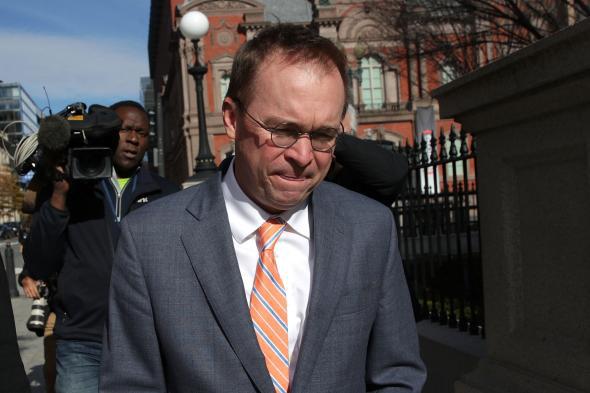The Trump White House, on Tuesday, won the first round of what appears likely to be an escalating battle over the soul of the Consumer Financial Protection Bureau, when a federal judge allowed White House Budget Director Mick Mulvaney to take control of the agency as its new acting head. Trump’s appointment of Mulvaney came after previous director and Obama-appointee Richard Cordray resigned and named the CFPB’s deputy director Leandra English, another Obama appointee, to serve as acting head of the agency. In response to Trump’s appointment, English filed for a temporary restraining order in federal court to block Mulvaney from replacing her.
At the core of the dispute is who has the authority to appoint a temporary successor to head the agency, but also the long-term future of the bureau. It’s not disputed that the president has the authority to name a permanent successor, but any permanent appointee will face Senate confirmation, which could take months. The Trump administration is not a fan of the consumer protection agency, which it sees as an unnecessary regulatory body, and does not want an Obama-era appointee leading the bureau as the White House attempts to chip away at its powers. On his first day at the agency, for instance, Mulvaney issued a 30-day freeze on the issuance of new rules and hiring.
English and proponents of the consumer protection bureau argue that the purpose of the agency is to protect against this very kind of direct political influence outside the bounds of congressional oversight, even if short term, which is why a succession plan was explicitly laid out in the 2010 Dodd-Frank Act that birthed the agency. From the New York Times:
The legal skirmish had pinned the language in two federal laws against each other. Ms. English and her lawyers argued that the Dodd-Frank Act, the 2010 law that established the bureau after a financial crisis, had made a succession plan clear: The deputy director was to serve as acting director in the absence of a permanent leader. Mr. Trump is able to appoint his own director, but confirmation could take months and slow Republican efforts to defang the agency. Mr. Cordray’s effort to appoint Ms. English was seen as an effort to extend this process…
In a brief filed with the court, more than two dozen members of Congress—as well as former Representative Barney Frank, Democrat of Massachusetts—argued that the law clearly established Ms. English as the bureau’s acting director under Dodd-Frank, which was written to protect the agency from political influence. Allowing the president to choose a successor under a different law would “mean that the bureau could be headed—potentially for many months—by an acting director handpicked by the president without the check of Senate confirmation, thus depriving the Bureau of the independence that was central to Congress’s plan in establishing it,” the brief said.
U.S. District Court Judge Timothy Kelly, a Trump appointee confirmed in September, sided with the administration that 1998 Federal Vacancies Reform Act gives the administration the authority to appoint a replacement and trumps the requirements of the Dodd-Frank Act.
